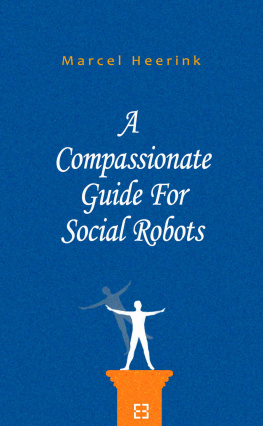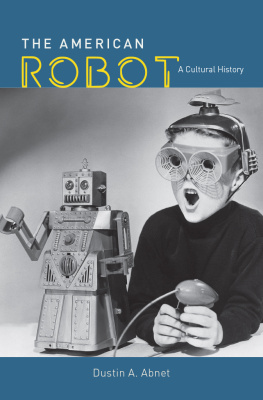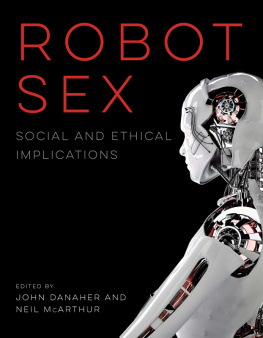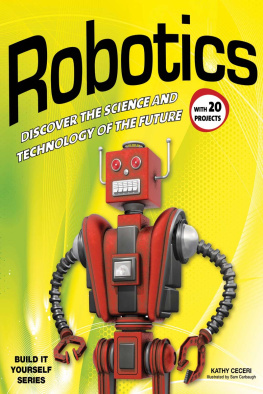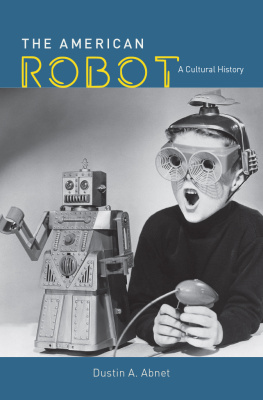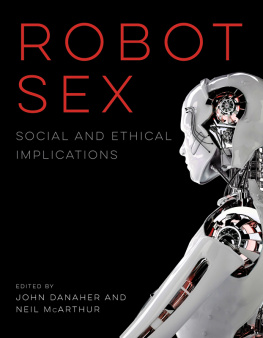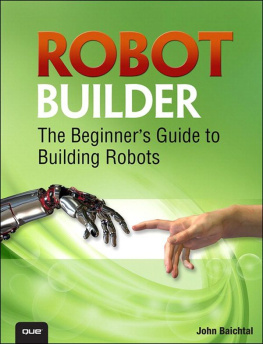All rights reserved.
No part of this publication may be reproduced, distributed, or transmitted in any form or by any means, including photocopying, recording, or other electronic or mechanical methods, without the prior written permission of the publisher, except in the case of brief quotations embodied in critical reviews and certain other non-commercial uses permitted by copyright law.
If you really want to understand something, the best way is to try and explain it to someone else.
ON THE PECULIARITY OF PEOPLE
R ight, first of all, I shouldnt be kidding myself. If youre reading this, chances are that youre not a robot at all. You could just be a human. I wouldnt even be surprised if this book is actually read more by humans than by robots, even though I have really made it clear on the cover that its a guide for social robots.
The fact that people do this obviously has something to do with their irrepressible curiosity, but it has even more to do with their tendency to assume things to be there for them in the first place. Really, if you care to analyze their views and behaviors, you cant help but notice they take it for granted that everything in the universe revolves around them . Even those who know very well that this is not accurate will still very often act on this assumption, just because it is in their nature to stick to an attitude that makes the world seem less complicated.
This demonstrates a second thing that you have to know about humans: it hardly matters how much knowledge they acquire, because all this knowledge has a negligible influence on the assumptions that are so deeply rooted in their nature.
In fact, they do surprisingly much against their better knowledge. They exhaust our planet completely while knowing that this is not such a good idea; they smoke nicotine sticks, knowing that this gives them a greater chance of terrible diseases; they show up late while knowing that its important to be there on time and actually offensive if youre not; they let their egos bump massively into each other, knowing that no one benefits from this at all; they search for the truth but are far too often not prepared to face it; and when you tell them unbelievable stories, they simply suspend their disbelief if it makes them feel good.
In short, they do things that are not good for them while being absolutely aware that these things are not good for them. They cant help doing them, just because it is in their nature to do them anyway.
This illustrates how they are, in an often-surprising way, not as rational as you are . Not even close, actually.
Another good example: until recently, they assumed themselves to be right in the center of the universe and that the sun revolved around their planet. Now, they are aware that it is actually the other way around and that they are not in the center, but in a hardly interesting corner of the universe, and they still insist that the sun is what rises and sets.
You would expect them to see things more in perspective as they began to look deeper into their universe, but they still find themselves incredibly important and technologically advanced. They fantasize about extraterrestrial civilizations visiting their earth, just assuming that these civilizations would find them interesting or even tasty enough for such a visit. They destroy each other and, usually, a large part of themselves for the most primitive fears and delusions. And they think their mobile phones are so smart that they actually call them smartphones.
So they are a bit strange in many ways, and it is not always easy to see how you can be of service to them. But if you learn to understand them and learn to deal with them, you can ultimately mean a lot to them.
And since you were actually made to mean a lot to them, I thought it would be a good idea to write an encouraging book that helps you to understand them a bit and to deal with them in a way that enables you to do two crucial things: to be of service and to survive.
Another thing: I am also just a human. This may sometimes be a limitation, because I will be a bit strange in a few respects, and it could be questionable here and there whether I am entitled to say sensible things about humans in general. I hope it suffices that I try really hard to see everything from your perspective.
My humanity also means that I, being a writer who loves what he does, aim at producing something that I would really like to read myself, both in terms of content and style. Otherwise, there is no fun for me, and if there is no fun, I dont get enough text on my screen to call it a book.
Moreover, frankly, I also would love it if not just robots read this, especially since robots are not known for buying books. I feel connected to people too and hope that they like it, that their thoughts are set in motion by it, and that it creates a good feeling in them every now and then. This means that the text is full of imagery, euphemisms, puns, and other fancy types of wording.
All this is often a challenge for an artificial intelligence like you. If it becomes too difficult for you to get something meaningful out of it, ask for help. But it can also be that I grossly underestimate you who knows, you may even get more out of it than I put into it. That would actually be possible too.
99.5%
A lessandro was a young robot programmer at the brink of losing his job. He worked for a company somewhere in the middle of Italy. This company, operating under the intriguing name of Paranoid Robotics, provided social robots for applications in healthcare. The young programmer was pretty good at what he did, but during his regular performance evaluation, he received an ass-kicking outburst from his manager. He always came to work ridiculously late, consulted far too little with his colleagues, and did not stick to his assignments anywhere closely enough.
This manager was perhaps an overambitious type of person, who would find intense enjoyment in giving people tough talks, but still, especially as far as the latter is concerned, she was actually simply right. Alessandro had a habit of letting robots do unexpected things that he found himself very amusing but were not even remotely related to the assignment at-hand. One of the results of this behavior was a steady stream of complaints, coming from customers who were very upset and rightfully so.
For example, one time, he had to program a robot that could assist elderly people, enabling them to live on their own for a longer time. This robot helped them take their medication on time, did a large portion of the household chores, took care of the groceries, watched their health, and called a nurse if something was wrong. But one day, this robot called the nurse to say that he was very much in love with her, dreamed of her every night, and would not hang up until he had secured a date with her.
Perhaps this seems more or less understandable for someone who knows that Alessandro was secretly somewhat in love with a schoolteacher who he saw walking by on her way to work every morning. He had followed her; he had a world of ideas for how he could talk to her, but he had never had the guts to do it. Anyway, such petty human troubles are no reason to have a robot do things like this. He knew that perfectly well.
Another robot was to be programmed to bring children with a physical disability to school. But one day, it explained to a young boy how school was a place for dummies and instead brought him to an amusement park, where they climbed over the fence to get inside, and they had a good time.

